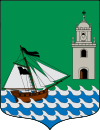Bakio
| Bakio | |||
|---|---|---|---|
| Municipality | |||
|
|||
| Location of Bakio within the Basque Country | |||
| Coordinates: 43°25′40″N 2°48′41″W / 43.42778°N 2.81139°WCoordinates: 43°25′40″N 2°48′41″W / 43.42778°N 2.81139°W | |||
| Country |
|
||
| Autonomous community |
|
||
| Province | Biscay | ||
| Comarca | Mungialdea | ||
| Founded | Unknown | ||
| Government | |||
| • Major | Aitor Apraiz (EAJ-PNV) | ||
| Area | |||
| • Land | 16.78 km2 (6.47 sq mi) | ||
| Elevation | 7 m (23 ft) | ||
| Population | |||
| • Total | 2.542 | ||
| • Density | 151.70/km2 (392.90/sq mi) | ||
| Demonym(s) | Bakiotarra | ||
| Time zone | CET (UTC+1) | ||
| • Summer (DST) | CEST (UTC+2) | ||
| Area code(s) | 48 | ||
| Official language(s) | Basque and Spanish | ||
| Website | http://www.bakio.org | ||
Bakio (Basque: Bakio, Spanish: Baquio) is a municipality in the province of Biscay (Basque Country, Spain).
It consists of a small valley which is drained inland by the River Estepona. This valley is surrounded by mountains to the east, south and west; meanwhilst, it is open to the north to the Cantabrian Sea. The municipality adjoins the sea to the north, the town of Bermeo to the east, the town of Mungia to the south, and the towns of Maruri-Jatabe and Lemoiz to the west. The town is well connected to the regional capital, Bilbao, with regular Bizkaibus services.
The town was formerly known as Básigo de Baquio, this being the name of its main neighbourhood.
In 1927, two neighbourhoods that until then had belonged to Bermeo, San Pelayo (San Pelaio) and Zubiaur, were added to the municipality. Despite its coastal location and its origin as a fishing village, Bakio does not have a seafaring tradition anymore and, in contrast, it has turned into a more traditional agricultural town. Nonetheless, the town has recently undergone significant urban renewal with the construction of new blocks of flats.
It has a special microclimate, with abundant rainfall and a warm climate with barely no snow or frost, which favours the cultivation of grapevines and the production of a wine called Txacoli.
Four parties put themselves forward as candidates to access the Town Council in this municipality: Bildu, EAJ-PNV, PSE-EE, and PP. These were the results:
These results led to the victory of the PNV. The independentist coalition Bildu obtained 5 town councillors, while both the PSE-EE and the PP failed to obtain any representation at all due to the very few votes they gathered.
...
Wikipedia



